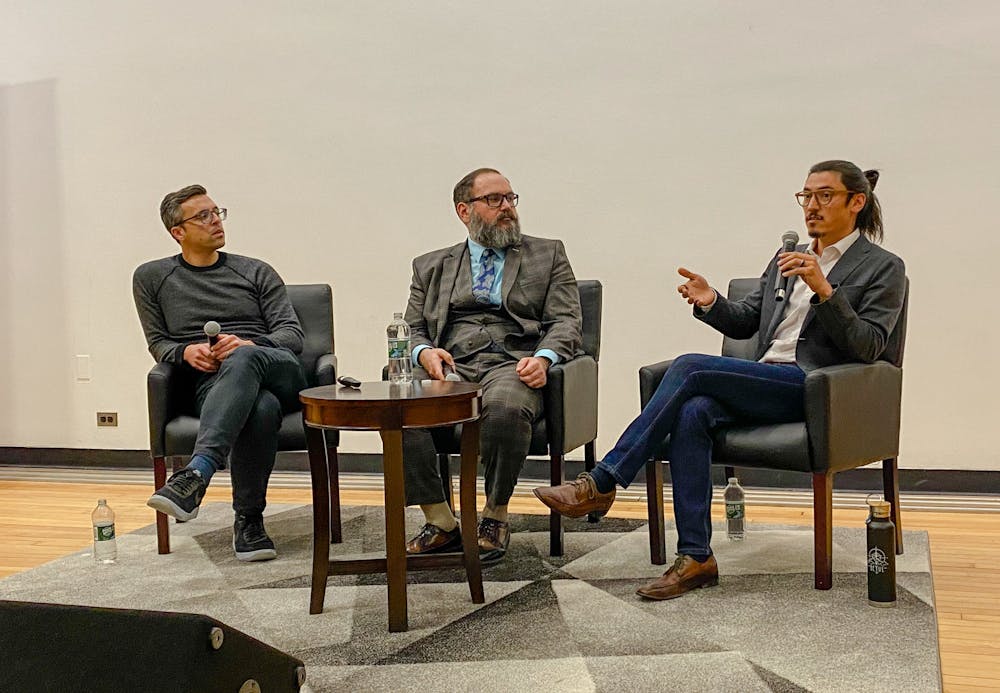Social media, Ezra Klein and Jeff Orlowski-Yang agreed, has created many problems. It incentivizes content that makes users “really mad or really excited” and dials up the “intensity” of American politics, Klein said. Social media’s machine learning algorithms, Orlowski-Yang noted, isolate users from viewpoints they do not share.
But at a Thursday night lecture, Klein, a New York Times columnist and co-founder of Vox, offered less certainty than Orlowski-Yang, the director of the Netflix documentary “The Social Dilemma” about the democratic implications of social media.
Organized by the Political Theory Project, the lecture, titled “Is Social Media a Threat to Democracy?” is part of the center’s Janus Forum series which aims to “engage contrasting perspectives simultaneously,” according to the PTP’s website. Klein and Orlowski-Yang’s perspectives contrasted in how definitive they were.
Orlowski-Yang offered a scathing critique of social media that defined it as an existential threat to democracy.
“I fundamentally believe that social media is in direct conflict with our democracy,” he said. “It’s one or the other.”
Explaining the effects of machine learning algorithms, Orlowski-Yang offered the metaphor of a grocery store with machine learning capabilities. If the store tracked not just his purchasing habits — heavy on vegetables — but also the items he eyed without purchasing such as cookies and ice cream, it would respond in the items it then chose to show him. Eventually, it would show him a “lot of ice cream and cookies,” he said.
“I will remove from my internalized experience and worldview the fact that vegetables exist,” he said. “Who the hell eats vegetables?”
Each user on social networks, he said, gets their own “personalized, custom feed” — with many including misinformation introduced by user-generated content.
“Each and every one of us is drifting off in our own direction,” Orlowski-Yang said. “Maybe a bunch of us are drifting in the same direction.”
As that drift occurs, users get separated from each other: Their ideas and thoughts become “unique, distant and separate” from people who go different directions, he added.
“We have lost that ability to even relate to that family member you see at Thanksgiving,” Orlowski-Yang said. “You’re like, what are they seeing? What are they reading?”
Politicians too have fallen victim to that drift, Orlowski-Yang added. As the viewpoints that users see get “slightly more extreme” over time, politicians worry that they might also be replaced by “somebody more extreme.”
“We’re only a decade into this experiment. What is it going to look like another decade from now?” he said. “It has me really worried.”
But while Klein shared concerns about social media, he qualified them with uncertainty: “I don’t know what level of threat or non-threat social media is to democracy,” he said.
Democracy’s problems, Klein argued, are not isolated. Considering the effect of social media on democracy “pretends democracy is a thing being acted on,” he said. In reality, “there’s a problem with the political system.”
That problem surrounds the difficulty of making policy in Congress, he said. When political fights result in tangible policy outcomes, they tend to have a depolarizing effect: The Affordable Care Act and the Bush-era tax cuts, he noted, saw significant jumps in popularity once they went into effect and lost their political connotations.
But the political system has ground to a near halt, Klein said. “When you can’t pass policy, you build (politics) over fights about symbolism and status,” he noted.
And as passing policy has become vexing, “constant outrages and novelty that the algorithms are finding” have filled the “hole” in the news cycle, Klein said. The media then amplifies those outrages, raising “the temperature on politics, … putting the system under a lot of stress.”
Still, he added that the “level of intensity” in politics has gone up as a result of social media, which aims to consume attention by “elicit(ing) a certain emotional energy.” The small share of social media users who consume political content can rally around increasingly extreme candidates, such as Rep. Marjorie Taylor Greene (R-GA), Klein said.
In the question-and-answer portion of the event, Klein noted that while more extreme Republicans who engage with social media aren’t necessarily common, they have distracted from an increasingly radicalized median.
“The extreme nuts have made a bunch of other nuts look normal,” he said, pointing to votes by the majority of House Republicans to not certify the 2020 election.
“Pulling numbers out of thin air — the mean intensity of American politics was a four before,” Klein said. “And now it’s a 7.5. When things get worse, it becomes a 10 or an 11. The whole system is under constant high-stakes conditions.”
Orlowski-Yang said he was hopeful about the political system “starting to wake up to the way this technology is designed.”
In an interview with The Herald, he noted that the conversation in Washington has changed: While the earliest Senate hearings about social media consisted of lawmakers’ asking Mark Zuckerberg how Facebook makes money, the “tone has completely shifted.”
At the event, Klein noted that one important regulation potentially could consist of “wall(ing) off” social media for children. But in an interview with The Herald, Klein noted that he was unsure if a policy solution — such as taking anti-trust action or addressing who is liable for what is said on social media — could solve its problems.
“It’s a really hard topic,” he said. “I think the level of solidity in our understanding is pretty low.”
Chaelin Jung ’23, a “religious” listener of Klein’s podcast for the Times, “The Ezra Klein Show,” said that the event made her reconsider the way she’ll use social media.
“It made me do a little bit of introspection about how I engage with social media,” she said. “Maybe I’ll go on a social media fast.”

Will Kubzansky was the 133rd editor-in-chief and president of the Brown Daily Herald. Previously, he served as a University News editor overseeing the admission & financial aid and staff & student labor beats. In his free time, he plays the guitar and soccer — both poorly.





